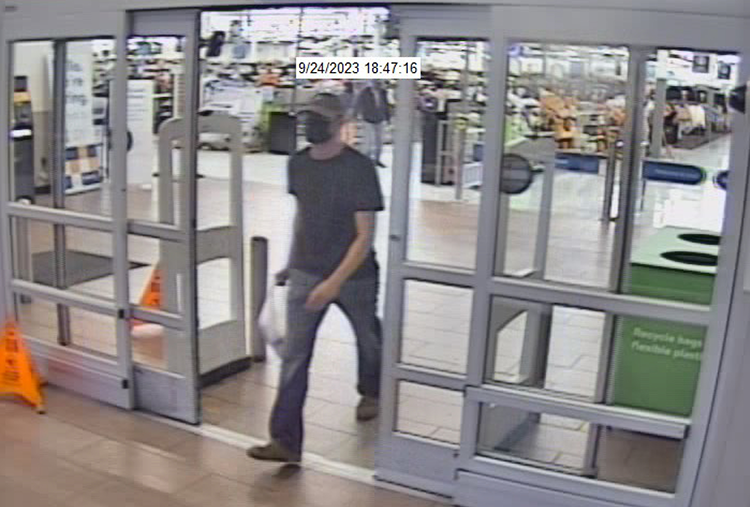Florida lawyer admits trying to ignite bomb outside Chinese embassy in DC

Christopher Rodriguez, in a photo from surveillance video, walks out of a store after purchasing a burner phone in Charlottesville, Virginia. (Photo from the U.S. District Court for the District of Columbia)
A criminal defense lawyer from Florida pleaded guilty Friday to trying to ignite an explosive device outside the Chinese Embassy in Washington last year, and he also admitted that he used the same method to cause an explosion in San Antonio in 2022 outside the headquarters of Texas Public Radio. His plea agreement calls for a sentence of seven to 10 years in prison, but the judge said Friday he had not decided whether to accept the sentencing terms.
Christopher Rodriguez, 45, a former public defender from Panama City, Fla., admitted that he placed a backpack containing explosive material next to a lamp post about 12 feet behind the Chinese Embassy in Northwest Washington on the morning of Sept. 25. He then went back across Van Ness Street to a vacant lot on the University of the District of Columbia campus and fired several shots at the backpack, but he missed, court records indicate.
However, Rodriguez used the same technique successfully in San Antonio in November 2022, prosecutors said. In that incident, Rodriguez placed explosive material at the base of a sculpture next to the San Pedro Creek Culture Park, just outside the public radio offices, court records state. Surveillance video shows Rodriguez walking up to the large silver sculpture, placing two canisters near the base and then walking away.
Prosecutors said Rodriguez then climbed onto a nearby roof and shot the canisters with a rifle, causing a brief explosion which did minor damage to the sculpture titled “Miss Mao Trying to Poise Herself at the Top of Lenin’s Head.” It shows a small, feminized figure of Mao Zedong using a long pole to balance on Vladimir Lenin’s head.
Rodriguez pleaded guilty to possessing a destructive device in the Texas incident, and damaging property occupied by a foreign government and causing malicious damage to federal property by explosives, which carries a five-year mandatory minimum sentence. His sentencing was set for Oct. 28, and Chief U.S. District Judge James E. Boasberg said he would inform the lawyers before that hearing as to whether he would issue a sentence within the seven-to-10-year range. If not, Rodriguez can withdraw his plea.
No motive was given for the two incidents. Rodriguez, who has been held in the D.C. jail since shortly after his arrest in November, answered Boasberg’s questions Friday about whether he understood the proceedings and was knowingly entering his pleas but did not otherwise discuss the case.
Agents from the Bureau of Alcohol, Tobacco, Firearms and Explosives worked the case, which started after a Secret Service agent discovered an unattended black backpack behind the Chinese embassy around 2:45 a.m. Surveillance footage helped them track the movements of an unidentified person in the hour before the backpack was found, leading to the discovery of shell casings at the vacant lot on the UDC campus, and bullet fragments next to a wall behind the embassy, court records show.
Inside the backpack was a bag with about 14 pounds of a gray granular material and two clear plastic containers with a half-pound each of a similar gray material. ATF Special Agent Denise Katolin Arrans wrote in an affidavit last fall that the “exploding targets” consisted of a binary explosive mixture, in which two substances combine to explode when struck with a bullet.
ATF then took a DNA sample from the backpack and got a hit in the national DNA databank because Rodriguez had been arrested in Los Angeles in 2021. In that case, according to Arrans’s affidavit, Rodriguez was found with a gun on the center console of his vehicle, two more guns elsewhere in the vehicle, and several bags and jars of “Tannerite,” a brand of exploding targets designed to blow up when hit by a bullet, “which is consistent with the substance recovered from the backpack found outside the Chinese Embassy.” The resolution of that case was not immediately available.
Agents began surveilling Rodriguez in Florida after the DNA hit, but automated license-plate readers used by police showed that he was driving in Georgia, North Carolina, Virginia and Florida. After agents used phone records to confirm his presence in D.C. on Sept. 25, Rodriguez was arrested in Louisiana on Nov. 4 and ordered held without bond. He was later transferred to the D.C. jail, where he has been held since.
Write a letter to the editor, share a story tip or update, or report an error.



